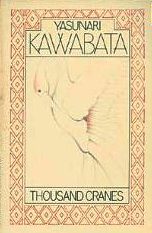Yasunari KawaThousand cranes
bata and Edward G. Seidensticker (tr)
Kawabata, Yasunari (1899-1972); Edward G. Seidensticker (tr);
Thousand cranes [orig: Sembazuru]
Knopf / Perigee, 1959, 147 pages
ISBN 0399505261
topics: | fiction | japan | nobel
Arranged like a japanese tea ceremony, the story settles like layers of of leaves in a 17th c. lacquered antique teapot. The tea ceremony itself forms the backdrop for much of the story. Master craftsmen and their tea pottery, paintings from bygone traditions, and classic poetry serve as the artifacts for unfolding the story. No doubt some connotations of the tea ceremony are lost to the non-Japanese reader, but the simple translations manages to convey the flow well, though one is left wanting to know more about tea sets made from dried-gourds by 17th c. masters, or the more about traditional views regarding drinking from chipped cups, and how such deformations compare to the dark black mark on Chikako's breast.
This mark on Chikako's breast runs like a black spoiler throughout the story, but it is revealed, along with many portents of the story, with a gentle touch. When Kikuji's father takes him to visit Chikako, she was in the inner room, trimming hair from a birthmark on her breast. She, unaware that the eight-year old Kikuji was with his father, hadn't bothered to wear her kimono, and quickly put it on after he sees her. No more is said about the Chikako's relation with his father.
The novel begins after his father's death, when Chikako invites Kikuji to come to a tea ceremony practice, where she wants him to meet a young lady. Despite this, Kikuji feels surprised when Chikako wants this to be a bride viewing, a miai. But it turns out that the person whom he meets here is Mrs. Ota, his father's lover, the one who was with him till his last days.
These two lovers of his father enmesh into his life, while he himself has to find his way among two eligible young women who he may be interested in, both connected with these two women. The story moves in gentle strokes, and the pages turn like leaves falling and in the end it leaves you with a feeling as if it is you who have been living the life of Kikuji.
Excerpts
[From the crowded train Kikuji looks down on a tree-lined avenue. "Solid occidental buildings", ending in the Palace moat] Looking down from the crowded train, he felt that the avenue alone floated in this strange time of evening, that it had been dropped here from some foreign country. 45 There had been a certain incongruity, as when someone living in an European house wears a kimono. 52 [Chikako's birthmark suffuses the story. Kikuji] could see his father biting at the biorthmark with dirty teeth. The figure of his father became the figure of Kikuji himself. 55 The white cranes from the Imamura girl's kerchief flew across the evening sun 66 [The maid fixes a morning glory - an indigo flower - in a red-lacquered gourd that may have belonged to Sen Sotan, a 17th c. tea master.] He gazed at it for a time. In a gourd that had been handed down for three centuries, a flower that would fade in the morning. 88 Like most men, he found it convenient to use a woman he had had an affair with. 95 [Chikako to Kikuji] [Yukiko's] face eluded him... her eyes and cheeks were abstract memories, like impressions of light; and the memory of that birthmark on Chikako's breast was concrete as a toad. 119 --bio Yasunari Kawabata (1899-1972) was born into a cultured family in Osaka. His father was a prominent physician, but died of tuberculosis when Yasunari was just two. Orphaned by the death of his mother the next year, he was raised by his grandparents in the country. He lost his grandmother when he was seven, and his only sister when he was nine. After the death of his grandfather at 16, he shifted to a dormitory. He graduated from the Tokyo Imperial University in March 1924. The next year, he published Izu-no Odoriko (the Izu dancer), which was well-received, but it was the novel Yukiguni (The snow country, serialized 1935-47) which cemented his reputation as Japan's leading man of letters. It was around this time that Yukio Mishima approached him; Kawabata arranged the publishing of some of his earliest work. In 1968 he was awarded the Nobel Prize for Literature Kawabata had long suffered from poor health, and on April 16, 1972, two years after Mishima's suicide, Kawabata committed suicide at his home in Zushi by gassing himself. He left no note. His biographer, Takeo Okuno, has related how he had nightmares about Mishima for two or three hundred nights in a row, and had been persistently depressed. [biography based on nobel page krijasto and wiki ]
amitabha mukerjee (mukerjee [at-symbol] gmail.com) 2010 Dec 06
